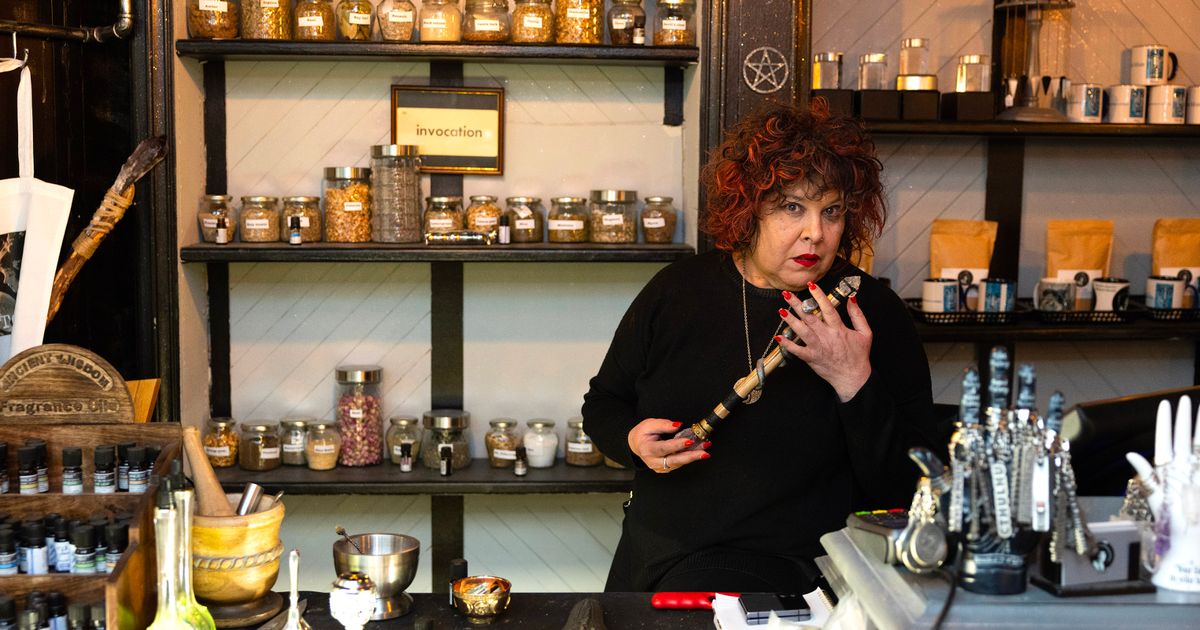Liverpool Clairvoyant: "Fortune-Telling" is a "Vulgar" Term, Says Shop Owner

Catherine de Leon, owner of the As Above So Below Emporium in Liverpool's Cavern Walks, has been offering tarot card and tea leaf readings for over 50 years. She's also a firm believer in the power of spirituality and divination, and offers bespoke spell kits, books and other items in her shop.
However, when it comes to the term "fortune-telling", de Leon is quick to distance herself. "It's an old-school term," she says, "and it conjures up images of 'madam so-and-so' at the arcade, or storefronts with neon signs in the window. Those of us who do readings don't like that term because it kind of vulgarises what we do."
De Leon's journey into the world of spirituality began at the tender age of 12. "My uncle gave me a tarot deck as a gift," she explains. "I opened it up and straightaway, I knew what I was doing. I never saw it in a film, or had it explained - I could just do it."
According to de Leon, those with her abilities often develop them during puberty, often triggered by a traumatic event. Her own father passed away when she was 12, and she believes this may have been the catalyst for her own spiritual awakening.
While she acknowledges tarot as a "scholarly thing", she believes the ability to divine the future is not something that can be learned. "You could be somebody who is a scholar of the deck, and you could read that deck academically and it would be a very bare bones kind of reading," she explained. "But you won't have the depth of somebody who is an academic reader, *plus
who has the ability to channel. And so I think the best reader is somebody who is a combination of both."
De Leon moved to Merseyside seven years ago and finds the local population more open-minded about spirituality compared to her native Massachusetts. "I think it's because of Europe," she says. "It's older, and spirituality is more acceptable because you're more connected to your pagan roots because it's all around you. I think in the States, the only connection to pagan roots are Native American."
She adds, "Here, you have stuff all over the place that's part of your lineage, part of your heritage. So I think people are less intimidated by it, and feel a natural connection to it. And I also think because the US was founded by a bunch of religious fanatics, they have an innate fear of anything that's not out of the King James Bible."
In Salem, where de Leon previously worked, she witnessed protests outside fortune-tellers' shops, "wearing balaclavas, yelling and screaming through megaphones." She has not experienced anything similar in Liverpool, despite the city's strong Christian heritage.
De Leon's clients are predominantly female, which aligns with a recent YouGov survey suggesting women are more open to fortune-telling than men. She caters to a diverse clientele, from those seeking spiritual guidance to groups of friends looking for a bit of fun.
"What I see is a combination of little old ladies who think a tealeaf reading would be a giggle," she explains, "or that they remember their nans or mums doing it. You get gangs of women who are on holiday and think it would be really fun and cool if they all got readings. And then you get people who are actually spiritual and they believe that when you get a reading there's a connection of energies."
De Leon's practice often blends elements of fortune-telling and therapy. "They'll come in and tell me about their issues," she says, "issues they might be having that they need work on or help working through. I'll put together a little kit. I give them all the components, but I will never do a spell for someone, because if you want to make change in your life you need to take responsibility for your life."
However, there are times when she must turn people away. This includes those who are intoxicated or confrontational. "If someone comes in and says, 'this is bulls**t, I will say no to them because it's disrespectful. If you don't believe in it, that's fine, but you don't have to come in."
De Leon also pushes back against criticisms that her practice exploits vulnerabilities and grief. While she acknowledges the potential for exploitation, she maintains a strict code of ethics and limits how often she will engage with clients. "If people contact me and have just had a reading two weeks ago or even a month ago I will say, 'no, you don't want to do that, because there's not going to be that great a change," she says. "The gods have already told you what you need to know, so let time pass, let things manifest, let things change and the dust settle, and in three months time get another reading'."
She firmly believes in ghosts, claiming her shop is haunted by two, including a "cigarette smoking man" who hasn't managed to quit even in death. However, she is sceptical of some of the TV psychics who claim to commune with the dead at will.
"I don't believe there is a sitting medium that can be 'on' 100 percent of the time," she says. "I don't believe they can make a connection with the right person at the right time, because you can't control Spirit! What if they don't want to come through?"
She adds, "And then you've got these guys on TV going like, 'I'm getting someone whose name begins with M,' and then someone shouts out, 'Mike, Mike, that's my uncle Mike,' because they want it so badly...people are so desperate and they expect they're going to get that - that the medium's going to be 'on' all the time."
Ultimately, de Leon's work is a testament to the human need for connection and understanding. Whether you believe in the power of her craft or not, there's no denying the comfort and insight she provides to those who seek her out. As she puts it, "Even if it is all smoke and mirrors, there is something irresistible about a stranger looking into your eyes - taking time just for you - and saying there is a path mapped out for you somewhere."





